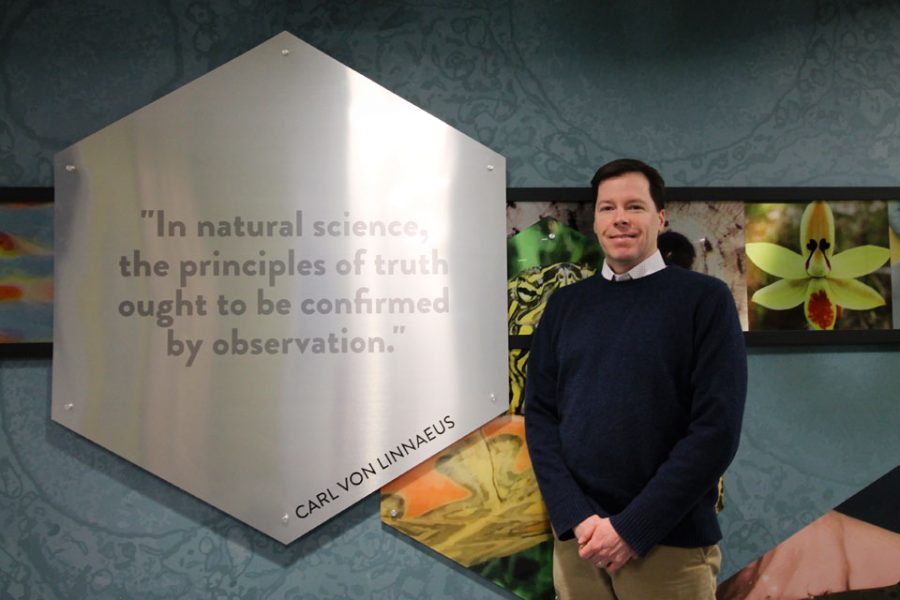SLU Biologist Selected for EPA Council Position
At the end of January, SLU biologist Jason Knouft, Ph.D. was chosen to serve on the National Advisory Council for Environmental Policy and Technology, or NACPET. The NACPET was founded in 1988 to provide independent advice to the Environmental Protection Agency. The council deals with a broad range of environmental policies, with a primary focus on environmental technology and management.
Knouft will serve with other members of academia, but as the EPA looks to the NACPET for “broad points of view from a diverse range of interest groups,” he will also work alongside representatives from the business and industrial sector, various non-governmental organizations and state and local government officials.
Regarding Knouft’s duties, he and his colleagues will be approached by the EPA during important junctions and be asked to give opinions on a variety of pressing environmental issues. Each advisor brings a unique background with specific strengths and specialties, which will inform the opinion of the council.
For Knouft, years of research experience studying fresh-water systems, among other areas of biology, will allow him to provide crucial insight on some of the most critical issues of the day.
He credits his time at SLU for preparing him to serve in his role on the council. “We deal with the impact of climate change on water resources, how agricultural practices impact water quality, urbanization, how road salt influences fresh water systems, how much people are willing to pay in taxes to increase water quality,” he explained “The work I’ve done has a good linkage between social systems, environmental systems, and biological systems, trying to link those three together.”
Knouft’s appointment comes at an incredibly volatile time in current debates over environmental policy. For better or worse, the Trump administration has taken a decidedly hostile—and at times overtly antagonistic—posture towards the EPA and its related entities.
President Trump’s choice for administrator of the EPA, Scott Pruitt, had spent his career as a self-described “advocate against the EPA’s activist agenda” which alongside his inexperience in the field and troubling financial ties to the fossil fuel industry made his nomination a controversial one. Pruitt resigned in July 2018 after intense scrutiny and an ongoing ethics scandal, exacerbating an already chaotic situation.
Nevertheless, Knouft and his colleagues will be asked to step up and deal with the chaos. Beyond the controversial appointments and budget cuts, the Trump administration has broached a number of environmental policy changes, both realized and anticipated. Many of the policy changes proposed seek to discard Obama-era policies aimed at limiting pollution and reversing climate change. It is the job of NACPET to provide quick and balanced responses to these continually evolving policy changes.
Knouft, however, stressed the importance of resisting the temptation to reduce our current dialogue down to partisan politics. “What is particularly important, rather than focusing on political polarization, is to have scientifically based reasoning coming into management of our resources,” he said “Having a scientific perspective is what is critical to reasonable use and management of our environmental systems.” He accentuated the unbiased properties of science, stating that “the goal of science is not to take a side, but to present unbiased information, in this case about human interaction with the planet.”
The importance of NACPET’s role in American environmental policy cannot be understated. For Knouft the dialogue between policy makers, climate and environment experts and the public is “absolutely critical” to creating sensible environmental legislation. The experts in the EPA, NACPET and other advisory bodies must process the complexity of the science behind climate change and other pressing environmental challenges in order to work alongside government officials to produce public policy which is both reasonable and productive.
Knouft is perfectly equipped to handle this facet of the position, as much of his research focuses on the intersection between social systems and biological or ecological systems. For instance, he has engaged in research which seeks to assess how much the American public is willing to pay in taxes to increase water quality. Projects like this mean that Knouft is already experienced in viewing environmental issues through a public policy framework, a skill that will undoubtedly be utilized in his advisory role.
As Knouft prepares to undertake the new responsibilities that accompany his appointment, he does so with a clear understanding of his duties and the challenges he will face. He is “extremely flattered” to be chosen, but beyond the general pride associated with the accomplishment, he is above all eager to make a “positive and tangible impact” on the United States and its environmental policy.
Your donation will support the student journalists of Saint Louis University.





